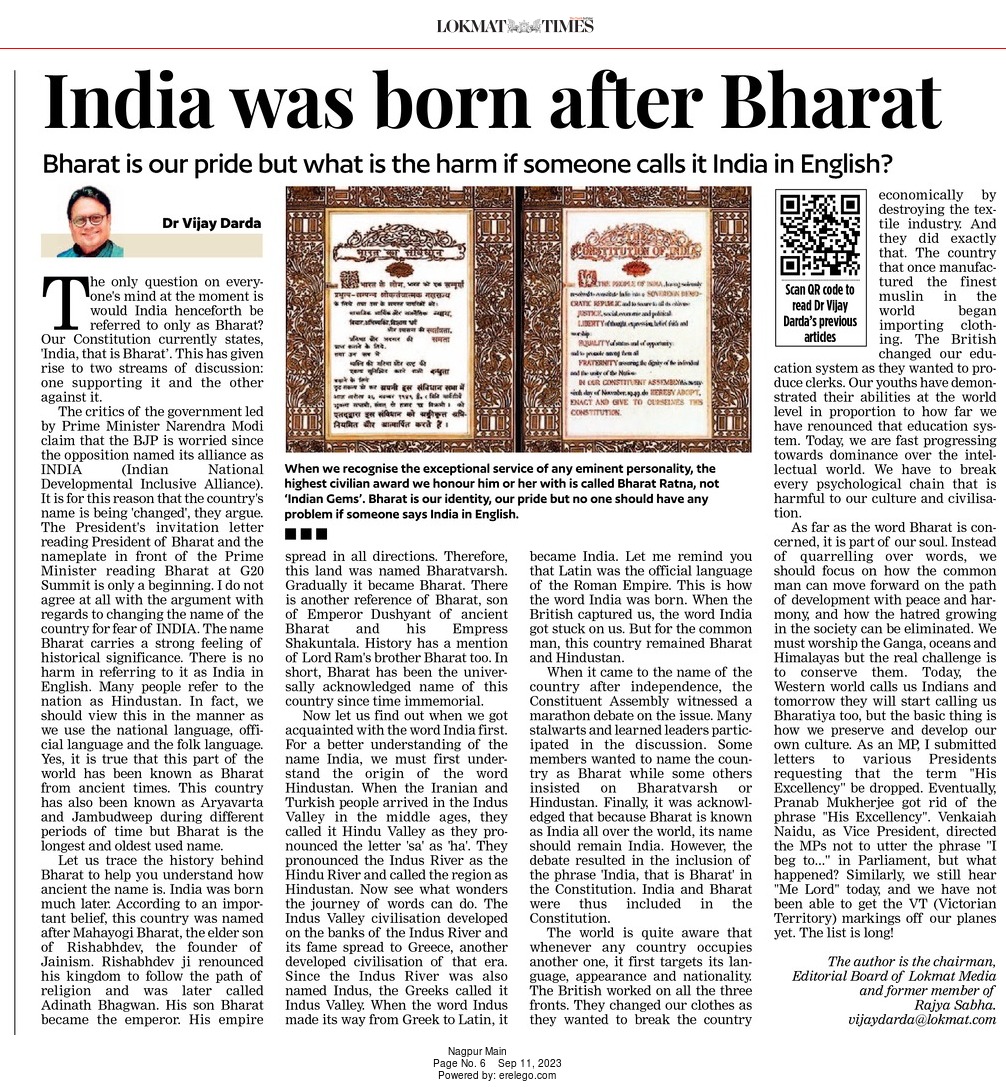India was born after Bharat
 By Vijay Darda | 11-09-2023
By Vijay Darda | 11-09-2023
Bharat is our pride but what is the harm if someone calls it India in English?
The only question on everyone’s mind at the moment is would India henceforth be referred to only as Bharat? Our Constitution currently states, ‘India, that is Bharat’. This has given rise to two streams of discussion: one supporting it and the other against it.
The critics of the government led by Prime Minister Narendra Modi claim that the BJP is worried since the opposition named its alliance as INDIA (Indian National Developmental Inclusive Alliance). It is for this reason that the country’s name is being ‘changed’, they argue. The President’s invitation letter reading President of Bharat and the nameplate in front of the Prime Minister reading Bharat at G20 Summit is only a beginning. I do not agree at all with the argument with regards to changing the name of the country for fear of INDIA. The name Bharat carries a strong feeling of historical significance. There is no harm in referring to it as India in English. Many people refer to the nation as Hindustan. In fact, we should view this in the manner as we use the national language, official language and the folk language. Yes, it is true that this part of the world has been known as Bharat from ancient times. This country has also been known as Aryavarta and Jambudweep during different periods of time but Bharat is the longest and oldest used name.
Let us trace the history behind Bharat to help you understand how ancient the name is. India was born much later. According to an important belief, this country was named after Mahayogi Bharat, the elder son of Rishabhdev, the founder of Jainism. Rishabhdev ji renounced his kingdom to follow the path of religion and was later called Adinath Bhagwan. His son Bharat became the emperor. His empire spread in all directions. Therefore, this land was named Bharatvarsh. Gradually it became Bharat. There is another reference of Bharat, son of Emperor Dushyant of ancient Bharat and his Empress Shakuntala. History has a mention of Lord Ram’s brother Bharat too. In short, Bharat has been the universally acknowledged name of this country since time immemorial.
Now let us find out when we got acquainted with the word India first. For a better understanding of the name India, we must first understand the origin of the word Hindustan. When the Iranian and Turkish people arrived in the Indus Valley in the middle ages, they called it Hindu Valley as they pronounced the letter ‘sa’ as ‘ha’. They pronounced the Indus River as the Hindu River and called the region as Hindustan. Now see what wonders the journey of words can do. The Indus Valley civilisation developed on the banks of the Indus River and its fame spread to Greece, another developed civilisation of that era. Since the Indus River was also named Indus, the Greeks called it Indus Valley. When the word Indus made its way from Greek to Latin, it became India. Let me remind you that Latin was the official language of the Roman Empire. This is how the word India was born. When the British captured us, the word India got stuck on us. But for the common man, this country remained Bharat and Hindustan.
When it came to the name of the country after independence, the Constituent Assembly witnessed a marathon debate on the issue. Many stalwarts and learned leaders participated in the discussion. Some members wanted to name the country as Bharat while some others insisted on Bharatvarsh or Hindustan. Finally, it was acknowledged that because Bharat is known as India all over the world, its name should remain India. However, the debate resulted in the inclusion of the phrase ‘India, that is Bharat’ in the Constitution. India and Bharat were thus included in the Constitution.
The world is quite aware that whenever any country occupies another one, it first targets its language, appearance and nationality. The British worked on all the three fronts. They changed our clothes as they wanted to break the country economically by destroying the textile industry. And they did exactly that. The country that once manufactured the finest muslin in the world began importing clothing. The British changed our education system as they wanted to produce clerks. Our youths have demonstrated their abilities at the world level in proportion to how far we have renounced that education system. Today, we are fast progressing towards dominance over the intellectual world. We have to break every psychological chain that is harmful to our culture and civilisation.
As far as the word Bharat is concerned, it is part of our soul. Instead of quarrelling over words, we should focus on how the common man can move forward on the path of development with peace and harmony, and how the hatred growing in the society can be eliminated. We must worship the Ganga, oceans and Himalayas but the real challenge is to conserve them. Today, the Western world calls us Indians and tomorrow they will start calling us Bharatiya too, but the basic thing is how we preserve and develop our own culture. As an MP, I submitted letters to various Presidents requesting that the term “His Excellency” be dropped. Eventually, Pranab Mukherjee got rid of the phrase “His Excellency”. Venkaiah Naidu, as Vice President, directed the MPs not to utter the phrase “I beg to…” in Parliament, but what happened? Similarly, we still hear “Me Lord” today, and we have not been able to get the VT (Victorian Territory) markings off our planes yet. The list is long!
Relevant Articles
All round development only can usher in peace in Valley
Saluting the liberator par excellence
